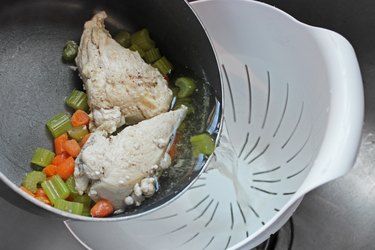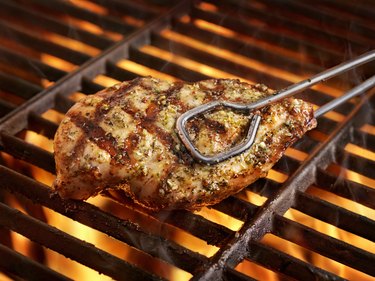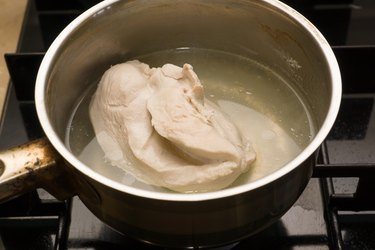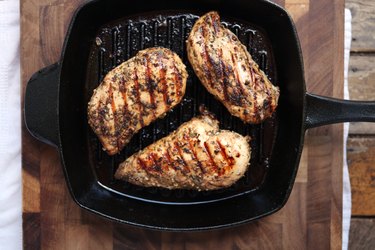
It's not immediately obvious, but chicken is surprisingly difficult to cook well on the grill. The pieces cook at different rates, it has to be done enough but not overdone, and you especially don't want a burnt outside and a raw inside. One way to ensure consistent results is to parboil chicken before grilling, but it's not a technique with which every grill master is comfortable.
Why Boil Chicken Before Grilling?
Video of the Day
If you've ever been served a piece of chicken that was charred on the outside but completely uncooked at the bone, you'll understand why pragmatic cooks look for an edge that can help them consistently make a better meal. A lot of recipes suggest that you boil your chicken before grilling, which ticks a lot of the necessary boxes:
Video of the Day
It provides the opportunity to bring all cuts —
breast, thigh, wings, drumsticks —
to a consistent degree of doneness before they hit the grill.
For health-conscious diners, it's an opportunity to render and discard some of the fat.
If crisp skin is your favorite part of the chicken, losing the layer of fat inside the skin helps it crisp quicker and more evenly.
Once the chicken has been parcooked, you can finish it off quickly at the grill and enjoy chicken that's consistently cooked to the perfect degree of doneness. As an added bonus, you won't need to spend as much time at your grill in the sweltering summer heat.

Don't Actually Boil Chicken Before Grilling
Paradoxically, the best way to boil chicken for the grill is ... not to boil it. Yes, you'll cook it in water, but it should never come to a boil. Your best bet is to gently poach the chicken pieces in water or another suitable cooking liquid at a temperature well below boiling, ideally no more than 180 degrees Fahrenheit. Boiling causes the proteins in the chicken to tighten up, making it tough. A gentle poach doesn't do that.
The time required to parcook your chicken will vary depending on the cut — especially whether it's boneless or bone-in — as well as the size of the individual pieces and the temperature of the poaching liquid. Your actual cooking time might range from 20 to 40 minutes or longer, so don't try to time the chicken. Instead, use an instant-read thermometer to check the pieces periodically and then remove them from the pan and let them drain once their internal temperature reaches 145 degrees.
That's 20 degrees below the USDA's recommended cooking temperature for chicken, and you'll easily make up the difference when you grill the pieces.
Warning
Don't parcook the chicken and then put it back in the fridge to finish later. That creates a great environment for bacteria to grow, and the USDA strongly discourages it.

The Problem With Boiling Chicken Before Grilling
While some cooks embrace paboiling chicken, others argue against it. The reason is that when you poach your chicken pieces, some of the flavor will escape into the cooking liquid. That's how soups and broths are made, after all.
There are two ways to counter that problem. One is to use liquids that actually add flavor to the chicken, from well-salted water to chicken broth to infusions of herbs, spices, and garlic. The other is to use a dry-heat method, such as baking, to parcook the chicken pieces.
Cooking the chicken pieces in your oven at 325 to 350 degrees — just until their internal temperature reaches 145 degrees when tested with an instant-read thermometer — gives the same benefits as parboiling but without any flavor loss. Which method you choose is largely a matter of personal preference, so you might wish to try both and see which one you prefer.
Tip
You can choose to parboil vegetables, grains, and other meats in addition to chicken.
